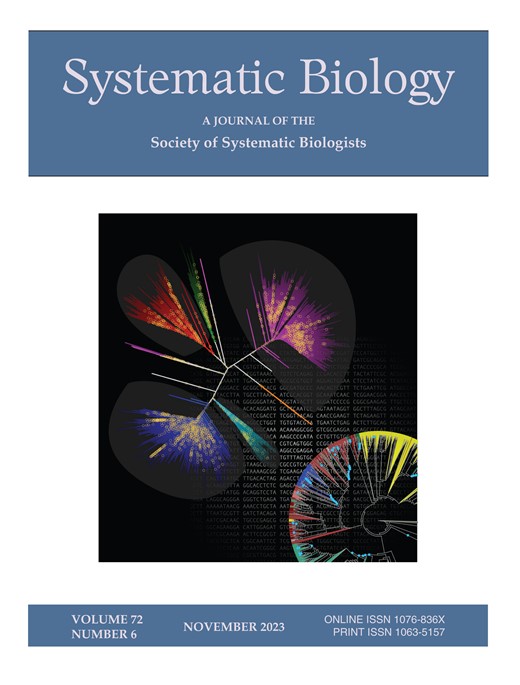揭示生态学和进化历史对鱼类表型趋同的影响。
IF 6.1
1区 生物学
Q1 EVOLUTIONARY BIOLOGY
引用次数: 0
摘要
理解适应性趋同的生态驱动因素和局限性是一个根本性的挑战。本文探讨了浮游鱼类的适应性收敛是如何受到多种生态因素、进化史和偶然性的影响的。利用超过1600种海洋物种的生态形态学数据,我们将基于模式的收敛度量与进化模型拟合相结合,以检验在零模型下,专业浮游动物之间的表型相似性是否超出预期,以及生态学、进化史或它们的综合效应是否能最好地解释性状进化。我们发现浮游动物在表型上明显比预期的更相似。与猎物探测和捕获功能相关的特征,如眼睛直径和下颚长度,是强烈趋同的,而一般的身体大小和形状受到进化历史影响最明显的分支之间的深刻分歧的限制。由于并非所有性状都经历了趋同生态形态的强烈选择,它们的进化轨迹并没有完全克服多元性状空间中的祖先差异,导致一种称为保守性的特定形式的收敛。我们展示了对喂养生态的适应性反应如何与其他生态压力(即光环境)和历史偶然性交织在一起,在较长时间内塑造鱼类的表型进化,为表型进化的普遍性提供了关键见解。本文章由计算机程序翻译,如有差异,请以英文原文为准。
Unravelling the Effects of Ecology and Evolutionary History in the Phenotypic Convergence of Fishes.
Understanding the ecological drivers and limitations of adaptive convergence is a fundamental challenge. Here, we explore how adaptive convergence of planktivorous fishes has been influenced by multiple ecological factors, evolutionary history, and chance. Using ecomorphological data for over 1600 marine species, we integrate pattern-based metrics of convergence with evolutionary model fitting to test whether phenotypic similarities among specialist planktivores exceed expectations under null models and whether ecology, evolutionary history, or their combined effects best explain trait evolution. We find that planktivores are significantly more similar in phenotype than expected. Traits with functional relevance for prey detection and capture, such as eye diameter and lower jaw length, are strongly convergent, while general body size and shape are constrained by deep divisions between clades where the effects of evolutionary history are most pronounced. Since not all traits undergo strong selection toward a convergent ecomorph, their evolutionary trajectories have not entirely overcome ancestral differences in the multivariate trait space, resulting in a specific form of convergence termed conservatism. We show how adaptive responses to feeding ecology intertwine with other ecological pressures (i.e., light environment) and historical contingency to shape fish phenotype evolution over deep time, offering key insights into the generality of phenotypic evolution.
求助全文
通过发布文献求助,成功后即可免费获取论文全文。
去求助
来源期刊

Systematic Biology
生物-进化生物学
CiteScore
13.00
自引率
7.70%
发文量
70
审稿时长
6-12 weeks
期刊介绍:
Systematic Biology is the bimonthly journal of the Society of Systematic Biologists. Papers for the journal are original contributions to the theory, principles, and methods of systematics as well as phylogeny, evolution, morphology, biogeography, paleontology, genetics, and the classification of all living things. A Points of View section offers a forum for discussion, while book reviews and announcements of general interest are also featured.
 求助内容:
求助内容: 应助结果提醒方式:
应助结果提醒方式:


